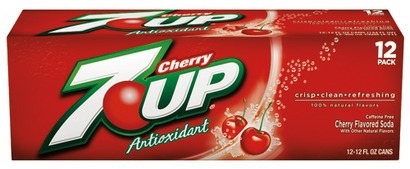Top Class Actions’s website and social media posts use affiliate links. If you make a purchase using such links, we may receive a commission, but it will not result in any additional charges to you. Please review our Affiliate Link Disclosure for more information.

According to the class action lawsuit, filed by the Center for Science in the Public Interest in California federal court, the products falsely give the impression that the antioxidants in the sodas come from the healthy fruits pictured on the label, when they actually come from being fortified with vitamin E. The sodas do not contain fruit or juice of any kind, the 7UP class action lawsuit says, despite having pictures of cherries, blackberries, cranberries, raspberries and pomegranates.
Making these claims is illegal, the 7UP class action lawsuit says, because the U.S. Food and Drug Administration prohibits fortifying nutritionally worthless snack foods and beverages with nutrients.
“Non-diet varieties of 7UP, like other sugary drinks, promote obesity, diabetes, tooth decay and other serious health problems and no amount of antioxidants could begin to reduce those risks,” Michael F. Jacobson, executive director of the CSPI, said in a statement. “Adding an antioxidant to a soda is like adding menthol to a cigarette — neither does anything to make an unhealthy product healthy.”
Jacobson added that 7UP Cherry Antioxidant contains water, high-fructose corn syrup, citric acid, potassium benzoate and the dye Red 40. One 12-ounce serving contains nine teaspoons of sugar and 140 calories.
The 7UP class action lawsuit accuses Dr Pepper Snapple Group, Inc. of “misleading consumers about the nutritional qualities, health qualities, and ingredients of its soft drinks” in order to “command a premium price for the products.”
It is seeking damages on behalf of a proposed class of all persons in the United States who purchased the products based on the allegedly misleading advertising and product packaging.
A copy of the 7UP Antioxidant False Advertising Class Action Lawsuit can be read here.
The case is David Green v. Dr. Pepper Snapple Group, Inc., U.S. District Court, Central District of California. The plaintiffs are represented by Reese Richman LLP and the Center for Science in the Public Interest.
UPDATE: Dr. Pepper Snapple Group Inc. has agreed to remove references to antioxidants and Vitamin E from certain 7UP products as part of a class action settlement reached July 15, 2013. The company will also pay $237,500 in attorneys’ fees plus $5,000 to the named plaintiff, David Green. There will be no monetary compensation for consumers as part of the class action settlement agreement. A copy of the agreement can be found here.
ATTORNEY ADVERTISING
Top Class Actions is a Proud Member of the American Bar Association
LEGAL INFORMATION IS NOT LEGAL ADVICE
Top Class Actions Legal Statement
©2008 – 2024 Top Class Actions® LLC
Various Trademarks held by their respective owners
This website is not intended for viewing or usage by European Union citizens.















11 thoughts on7UP Antioxidant False Advertising Class Action Lawsuit
Add me